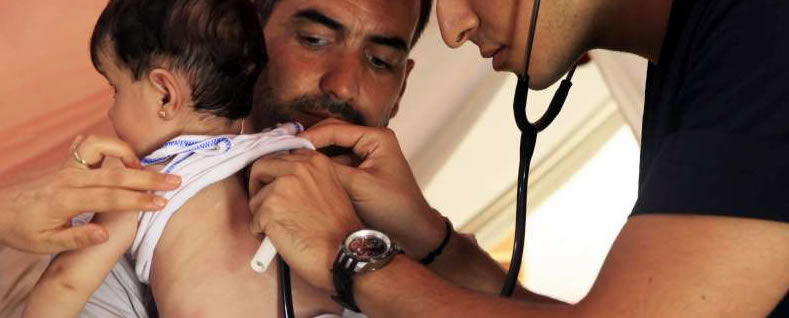Health

supporting refugees
HEALTH
War, conflict and damage to infrastructure in countries that refugees flee from often means that they are unable to access basic health services. Refugees often have limited access to medical assistance or primary health care facilities during their refugee journey or in their country of first asylum. Safe drinking water and nutritious food are not always available.
Refugee children and their families may have had little if any medical attention for some time before arriving in Australia. On arrival, they may be unaware of the types of primary and preventative health care programs in place, such as:
- maternal health
- immunisations
- oral health
- good nutrition and healthy lifestyles
- physical health
- mental health.
Newly arrived people from refugee backgrounds may have difficulty accessing these services due to language or cultural barriers. Without knowledge of the health care system, they may not always prioritise their health needs.
Many people from refugee backgrounds continue to struggle with grief and anxiety after they arrive in Australia. They may suffer from the impact of trauma related to torture or conflict, or guilt from having left friends and family behind in conflict zones. Settling into a new country requires enormous periods of adjustment, particularly if/ when their journey was forced upon them and unplanned.
Good health is an essential part of successful settlement. There is a coordinated effort among refugee support services to ensure that refugee health is prioritised as soon as possible following arrival in Australia - in order for people to have the best chance possible of a healthy future.
Practitioners have identified that there should be a focus on:
- ensuring that refugee families are screened and immunized early
- coordination of support available from government providers and health care professionals
- use of interpreting services
- cultural sensitivity in providing health services.
Many schools now work in partnership with STARTTS and NSW Refugee Health to provide counselling and health services for refugee students. Some schools have created partnerships with community organisations to promote health education and services to their students and families.
NSW Refugee Health
The NSW Refugee Health Service assists both refugee families and health practitioners. The NSW Refugee Health Service provides a free health assessment for newly arrived refugees through clinics run by nurses. This provides an initial point of contact with the health system for newly arrived refugees and asylum seekers as well as referral to local General Practitioners (GPs) for ongoing health care. Professional interpreters are used to provide language support, as required.
NSW Refugee Health also offers outreach services to some schools in areas of high refugee settlement and has an early childhood nurse program that can provides specialised services for families with young children.
More information
The Sydney Children’s Hospital Network (SCHN) has a Children’s Refugee Service that provides advocacy, research, training, and clinical services to children with a refugee background and their families and the health professionals caring for them. It combines two multidisciplinary pediatric refugee health clinics:
- The Health Assessment for Refugee Kids (HARK) clinic at The Children’s Hospital, Westmead
- The Refugee Child Health Clinic at Sydney Children’s Hospital
Victorian Refugee Health Network provides online resources for health practitioners and people from a refugee background.
Foundation House, in Victoria, produces a range of publications and resources that aim to advance the health, wellbeing and human rights of people from refugee backgrounds who have experienced torture and trauma.
NSW Service for the Treatment and Rehabilitation of Trauma and Torture Survivors (STARTTS) provides culturally relevant psychological treatment and support, and community interventions, to help people and communities recover from torture and refugee trauma and rebuild their lives in Australia.
The Fairfield/ Liverpool Youth Health Team (FLYHT) operates a local health clinic for young people. It offers free comprehensive medical and psychological assessment, counselling, treatment and referral for newly arrived refugees aged 12 to 24 years old who are settling in South West Sydney.
